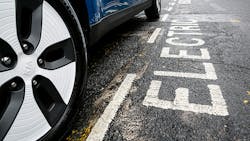Without Engines, Electric Cars Might Be Sputtering Out
Electric cars might need some more horsepower for an uphill climb that shows no sign of levelling off.
According to a new survey of almost 1,000 automotive executives and about 2,100 consumers around the world, more people than not think pure battery electric vehicles (BEVs) will fail commercially because of infrastructure challenges or slow recharging times — and almost no one admitted plans to actually drive one off the lot any time soon.
KPMG released its annual Global Automotive Executive Survey this morning with those facts and plenty more. Among them: About half of all consumer respondents globally said they would opt for either a hybrid electric (33%) or a plugin hybrid electric (17%) over a BEV. Here in the United States, a majority of consumers said they would just stick with their internal combustion engine (ICE) vehicle, thanks.
“The internal combustion engine isn’t perfect, but U.S. consumers will continue to stick with what they know and have come to rely on,” said Gary Silberg, the automotive sector leader at KPMG. “Until the value propositions for alternative powertrains become crystal clear to them, consumers will make decisions based on convenience and the overall economics of owning a car — and right now a traditional vehicle still comes out on top for the vast majority of people.”
If electric vehicles do gain traction, BMW (21%) and Tesla Motors (14%) are the automakers that global execs think will be leading the field seven years from now. (American executives, for the record, flip those two, with one in five saying Tesla will be at the head of the pack, inching ahead of BMW.)
Perhaps the biggest roadblock is that just 13% of consumer respondents — and just 5% of those surveyed from America — said they would actually purchase a BEV in the next five years. (Of course, only about one of every 100 cars on the road around the world right now are BEVs, so maybe those numbers aren’t so bad.) Battery charge was cited most often as the reason for steering clear, but it was hardly the only one.
Because of uncertainty over future technology, about four of every five Americans who currently drive a BEV lease their vehicle. The resale value of BEVs also drops far more precipitously than ICE vehicles: According to a recent Bloomberg report, BEV compacts sold in 2014 are only worth 23% of their original sticker price, while comparable ICE vehicles are still worth about 41% of what they originally cost on the lot.
“Automakers are adapting to stricter vehicle efficiency standards, and electrification is a big part of that equation” SIlberg said. “What’s unclear is the value proposition for consumers, especially on vehicles outside the premium market. Given the multi-billion dollar investments — especially in China — the complex global regulatory environment and rapid technological disruption, there will be clear winners and losers in this EV game.”
On a more optimistic note, 77% of global auto execs and 85% of American execs said they think fuel-cell electric mobility will be the real breakthrough for the tech. Hope charges eternal.
Most drivers, meanwhile, focus only on the bottom line: 67% of consumers surveyed said they don’t care about drivetrain technology. Just give them the most durable, cost-competitive solution that can move them from point A to point B.
About the Author
Matt LaWell
Staff Writer
Staff writer Matt LaWell explores news in manufacturing technology, covering the trends and developments in automation, robotics, digital tools and emerging technologies. He also reports on the best practices of the most successful high tech companies, including computer, electronics, and industrial machinery and equipment manufacturers.
Matt joined IndustryWeek in 2015 after six years at newspapers and magazines in West Virginia, North Carolina and Ohio, a season on the road with his wife writing about America and minor league baseball, and three years running a small business. He received his bachelor's degree in magazine journalism from Ohio University.
